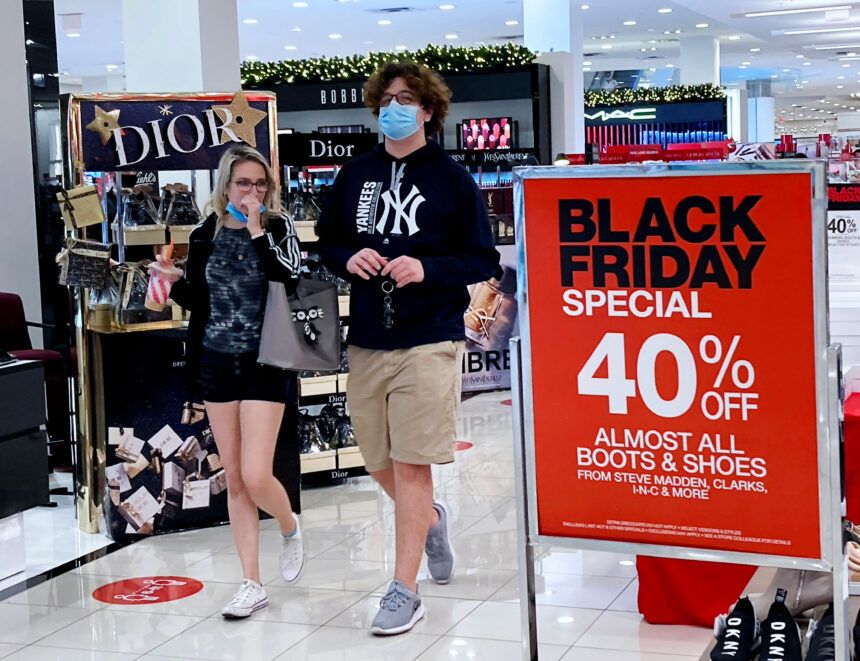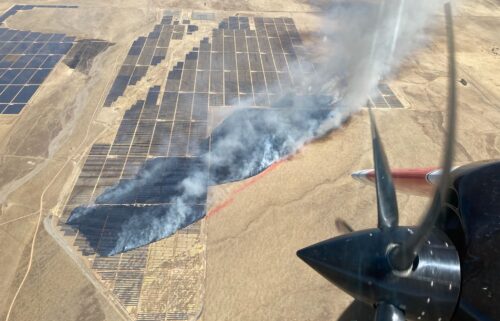Black Friday is different this year. But all is not lost for retailers

(CNN) -- It's no secret that this Black Friday looks different from the ones that have come before it.
The pandemic has cast a pall over retail's big day, leading shoppers to swap crowds for internet sales. Nearly 51% of shoppers feel anxious about shopping in-store during the holidays, and 64% of their budget is expected to be spent online, according to a survey from Deloitte published last month.
But experts say these changes aren't a one-off, and could usher in a more permanent transition. Here are some of the ways 2020 could serve as an inflection point.
- Black Friday starts in October: Black Friday deals that are usually reserved for in-store shopping have appeared online for a month. After this year, a longer promotional period could become the norm. Who says buying gifts should start after Thanksgiving?
- More pickup options: Curbside pickup has seen a boom in popularity this year, and stores are taking note. Per Deloitte's survey, 27% of respondents said they were likely to utilize curbside pickup this holiday shopping season, up from 11% last year.
- Free shipping is expected: Even before the pandemic, more people were starting to see free shipping as standard. This trend is only due to grow as comfort with online shopping builds and the Amazon Prime effect sets in.
That's not to say retailers are giving up on the in-store experience. Best Buy is among stores opening their doors at 5 a.m. while mandating that shoppers wear face masks. At Walmart, customers will be instructed to form single-file lines at the entrance and will receive sanitized shopping carts.
Health officials are hoping that the pandemonium of the past will be limited. Thanksgiving marked the 24th consecutive day that the US has reported more than 100,000 new coronavirus cases. The number of Covid-19 patients in US hospitals hit a record for the 17th straight day, with many medical centers warning they are near capacity.
Despite the pandemic, the National Retail Foundation has forecast that holiday sales during November and December will increase between 3.6% and 5.2% over 2019, totaling between $755.3 billion and $766.7 billion.
"Consumers have shown they are excited about the holidays and are willing to spend on gifts that lift the spirits of family and friends after such a challenging year," NRF President Matthew Shay said in a statement. "We expect a strong finish to the holiday season, and will continue to work with municipal and state officials to keep retailers open and the economy moving forward at this critical time."
The other trade war: China slaps duties on Australian wine
Tensions between Australia and China are picking up again. The latest casualty? Australian winemakers.
Chinese regulators announced Friday that they would impose heavy duties on Australian wines after finding preliminary evidence of dumping, my CNN Business colleague Michelle Toh reports. Starting Saturday, China will begin temporarily slapping duties of up to 212%.
The backstory: China announced an anti-subsidy investigation of some Australian wine imports in August, following a complaint from the China Wine Industry Association. The Commerce Ministry now says it has confirmed cases of dumping, "causing material damage" to the domestic wine industry.
The effects of the new measures could be devastating. China is by far the biggest importer of Australian wine, according to Wine Australia, a trade organization backed by the country's government.
Australia has upset China this year by calling for an investigation into the origins of the coronavirus pandemic. Beijing later targeted Canberra over trade, namely by suspending some imports of beef and slapping heavy tariffs on barley.
What's next: Australia and China recently both signed onto a major trade deal — the Regional Comprehensive Economic Partnership, or RCEP. Some had suggested that the agreement could help the two countries rebuild ties, but they don't appear headed toward reconciliation.
Amazon to pay workers bonuses as unions apply pressure
Amazon is spending hundreds of millions of dollars on holiday bonuses for its front-line employees, who are due to face a flood of demand in coming weeks.
The move comes as the company faces the threat of strikes over the Black Friday shopping weekend, my CNN Business colleague Hanna Ziady reports.
Overall, Amazon is spending $2.5 billion this year on "special bonuses and incentives" for teams globally, Amazon's senior vice president for worldwide operations Dave Clark said in a statement. The latest incentive includes a $300 bonus for full-time US employees, and $150 for part-timers.
"Our teams are doing amazing work serving customers' essential needs, while also helping to bring some much-needed holiday cheer for socially-distanced families around the world," Clark said.
Big picture: Amazon has been one of the few retailers that has thrived amid the pandemic. The company expects revenues to exceed $100 billion for the first time in the fourth quarter, bringing total sales for 2020 to more than $370 billion ---- a third higher than last year. Shares have jumped 72% in 2020.
But unions and advocacy groups are trying to use the shopping weekend to call attention to concerns about worker compensation and safety, as well as Amazon's environmental footprint.
In Germany, one of Amazon's biggest markets in Europe, trade union Verdi is calling for a three-day strike at seven of the company's fulfillment centers. The union wants Amazon to recognize a collective labor agreement that covers wages, bonuses and paid time off.
Up next
US stock markets close early Friday.
Coming next week: Outgoing Treasury Secretary Steven Mnuchin and Federal Reserve Chair Jerome Powell testify before the US Senate next week. Will their disagreements about how to prop up the ailing US economy spill out into the open?
The-CNN-Wire
™ & © 2020 Cable News Network, Inc., a WarnerMedia Company. All rights reserved.



